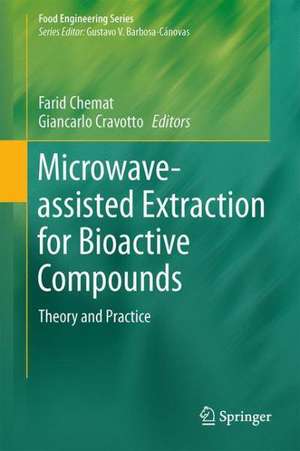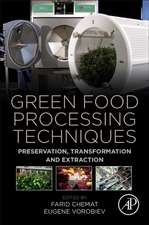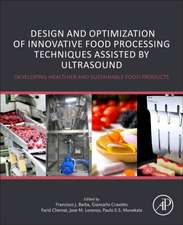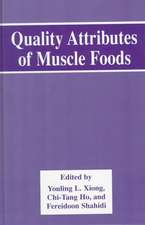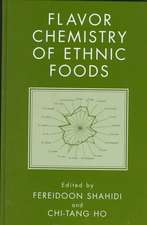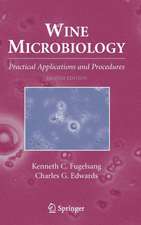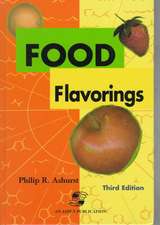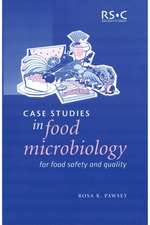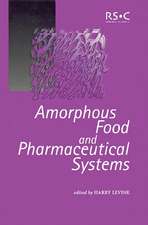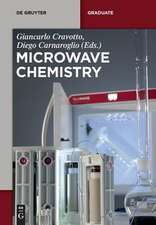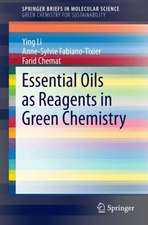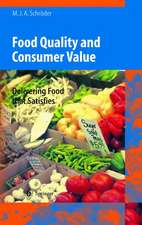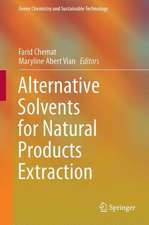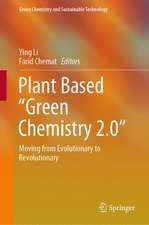Microwave-assisted Extraction for Bioactive Compounds: Theory and Practice: Food Engineering Series
Editat de Farid Chemat, Giancarlo Cravottoen Limba Engleză Hardback – 11 dec 2012
| Toate formatele și edițiile | Preț | Express |
|---|---|---|
| Paperback (1) | 694.69 lei 43-57 zile | |
| Springer Us – 28 ian 2015 | 694.69 lei 43-57 zile | |
| Hardback (1) | 642.51 lei 43-57 zile | |
| Springer Us – 11 dec 2012 | 642.51 lei 43-57 zile |
Din seria Food Engineering Series
- 18%
 Preț: 980.95 lei
Preț: 980.95 lei - 15%
 Preț: 647.92 lei
Preț: 647.92 lei - 23%
 Preț: 856.71 lei
Preț: 856.71 lei - 15%
 Preț: 647.40 lei
Preț: 647.40 lei - 15%
 Preț: 646.30 lei
Preț: 646.30 lei -
 Preț: 384.86 lei
Preț: 384.86 lei - 18%
 Preț: 966.78 lei
Preț: 966.78 lei - 18%
 Preț: 1236.38 lei
Preț: 1236.38 lei - 15%
 Preț: 656.74 lei
Preț: 656.74 lei - 15%
 Preț: 653.33 lei
Preț: 653.33 lei - 18%
 Preț: 951.59 lei
Preț: 951.59 lei - 18%
 Preț: 944.99 lei
Preț: 944.99 lei - 15%
 Preț: 716.15 lei
Preț: 716.15 lei - 18%
 Preț: 1232.57 lei
Preț: 1232.57 lei - 15%
 Preț: 647.92 lei
Preț: 647.92 lei - 15%
 Preț: 587.85 lei
Preț: 587.85 lei - 18%
 Preț: 1222.80 lei
Preț: 1222.80 lei - 18%
 Preț: 952.09 lei
Preț: 952.09 lei - 18%
 Preț: 1398.31 lei
Preț: 1398.31 lei -
 Preț: 399.12 lei
Preț: 399.12 lei - 18%
 Preț: 954.14 lei
Preț: 954.14 lei - 15%
 Preț: 644.95 lei
Preț: 644.95 lei - 18%
 Preț: 968.65 lei
Preț: 968.65 lei - 15%
 Preț: 638.89 lei
Preț: 638.89 lei - 18%
 Preț: 962.49 lei
Preț: 962.49 lei - 18%
 Preț: 1008.25 lei
Preț: 1008.25 lei - 18%
 Preț: 1225.79 lei
Preț: 1225.79 lei - 18%
 Preț: 961.41 lei
Preț: 961.41 lei - 18%
 Preț: 1378.86 lei
Preț: 1378.86 lei - 18%
 Preț: 961.72 lei
Preț: 961.72 lei -
 Preț: 489.30 lei
Preț: 489.30 lei - 18%
 Preț: 1388.05 lei
Preț: 1388.05 lei - 18%
 Preț: 1235.08 lei
Preț: 1235.08 lei - 15%
 Preț: 643.34 lei
Preț: 643.34 lei - 18%
 Preț: 2109.71 lei
Preț: 2109.71 lei - 18%
 Preț: 1815.87 lei
Preț: 1815.87 lei - 15%
 Preț: 644.95 lei
Preț: 644.95 lei - 18%
 Preț: 957.32 lei
Preț: 957.32 lei - 18%
 Preț: 973.06 lei
Preț: 973.06 lei
Preț: 642.51 lei
Preț vechi: 755.88 lei
-15% Nou
Puncte Express: 964
Preț estimativ în valută:
122.98€ • 133.63$ • 103.37£
122.98€ • 133.63$ • 103.37£
Carte tipărită la comandă
Livrare economică 21 aprilie-05 mai
Preluare comenzi: 021 569.72.76
Specificații
ISBN-13: 9781461448297
ISBN-10: 1461448298
Pagini: 252
Ilustrații: XII, 240 p.
Dimensiuni: 155 x 235 x 25 mm
Greutate: 0.48 kg
Ediția:2013
Editura: Springer Us
Colecția Springer
Seria Food Engineering Series
Locul publicării:New York, NY, United States
ISBN-10: 1461448298
Pagini: 252
Ilustrații: XII, 240 p.
Dimensiuni: 155 x 235 x 25 mm
Greutate: 0.48 kg
Ediția:2013
Editura: Springer Us
Colecția Springer
Seria Food Engineering Series
Locul publicării:New York, NY, United States
Public țintă
Professional/practitionerCuprins
1. Microwave-assisted extraction - an introduction to dielectric heating.- 2. Fundamentals of microwave extraction.- 3. Microwave assisted extraction of essential oils and aromas.- 4. The Role of Microwaves in the Extraction of Fats and Oils.- 5. Microwave-Assisted Extraction of Antioxidants and Food Colors.- 6. The Role of Micowaves in Omics Disciplines.- 7. Pharmaceutical and nutraceutical compounds from natural matrices.- 8. From Laboratory to Industry: Scale-up, Quality and Safety Consideration for Microwave-Assisted Extraction.
Notă biografică
Farid Chemat, Professor
His main research interests are focused on innovative and sustainable extraction techniques (especially microwave, ultrasound and green solvents) for food, pharmaceutical and cosmetic applications. He is coordinator of a new group named “France Eco-Extraction” dealing with international dissemination of research and education on green extraction technologies.
Université d’Avignon et des Pays du Vaucluse, INRA, UMR 408, F-84000 Avignon, France.
Giancarlo Cravotto, Professor
His research activity has been cantered on pharmacologically active natural products (isolation, structural elucidation, total synthesis and chemical modification). These studies have paved the road to new synthetic procedures and extraction techniques, particularly in the fields of ultrasound- and microwave-assisted protocols and flow-chemistry.
Dipartimento di Scienza e Tecnologia del Farmaco, University of Turin, I-10125 Turin, Italy.
His main research interests are focused on innovative and sustainable extraction techniques (especially microwave, ultrasound and green solvents) for food, pharmaceutical and cosmetic applications. He is coordinator of a new group named “France Eco-Extraction” dealing with international dissemination of research and education on green extraction technologies.
Université d’Avignon et des Pays du Vaucluse, INRA, UMR 408, F-84000 Avignon, France.
Giancarlo Cravotto, Professor
His research activity has been cantered on pharmacologically active natural products (isolation, structural elucidation, total synthesis and chemical modification). These studies have paved the road to new synthetic procedures and extraction techniques, particularly in the fields of ultrasound- and microwave-assisted protocols and flow-chemistry.
Dipartimento di Scienza e Tecnologia del Farmaco, University of Turin, I-10125 Turin, Italy.
Textul de pe ultima copertă
Microwave-assisted extraction of bioactive compounds is a research area of extreme interest in several industry fields (e.g., food, cosmetic, perfumery, pharmaceutical, nutraceutical). Using microwaves, full reproducible extractions can be accomplished in seconds or minutes with high reproducibility, reducing solvents and energy consumption, simplifying manipulation and work-up, giving higher products purity, and eliminating post-treatment of waste water.
This book explores the latest innovations of microwave extraction in terms of processes and products. This book will be of interest to academia, and research and industry that is looking for alternative “green” processes or attempting to diversify into new products such as essential oils, aromas, fat and oils, alkaloids, pigments, anti-oxidants, and other bioactive compounds.
Farid Chemat, Professor
Université d’Avignon et des Pays du Vaucluse, INRA, Avignon, France
Chemat's main research interests are focused on innovative and sustainable extraction techniques (especially microwave, ultrasound and green solvents) for food, pharmaceutical and cosmetic applications. He is coordinator of a new group named “France Eco-Extraction” dealing with international dissemination of research and education on green extraction technologies.
Giancarlo Cravotto, Professor
Dipartimento di Scienza e Tecnologia del Farmaco, University of Turin, Italy
Cravotto's research activity has been centered on pharmacologically active natural products (isolation, structural elucidation, total synthesis and chemical modification). These studies have paved the road to new synthetic procedures and extraction techniques, particularly in the fields of ultrasound- and microwave-assisted protocols and flow-chemistry.
This book explores the latest innovations of microwave extraction in terms of processes and products. This book will be of interest to academia, and research and industry that is looking for alternative “green” processes or attempting to diversify into new products such as essential oils, aromas, fat and oils, alkaloids, pigments, anti-oxidants, and other bioactive compounds.
Farid Chemat, Professor
Université d’Avignon et des Pays du Vaucluse, INRA, Avignon, France
Chemat's main research interests are focused on innovative and sustainable extraction techniques (especially microwave, ultrasound and green solvents) for food, pharmaceutical and cosmetic applications. He is coordinator of a new group named “France Eco-Extraction” dealing with international dissemination of research and education on green extraction technologies.
Giancarlo Cravotto, Professor
Dipartimento di Scienza e Tecnologia del Farmaco, University of Turin, Italy
Cravotto's research activity has been centered on pharmacologically active natural products (isolation, structural elucidation, total synthesis and chemical modification). These studies have paved the road to new synthetic procedures and extraction techniques, particularly in the fields of ultrasound- and microwave-assisted protocols and flow-chemistry.
Caracteristici
Current knowledge on Microwave-Assisted Extraction (MAE) Describes the advantages of using microwave energy MAE as a new "green" technique in extraction Includes supplementary material: sn.pub/extras
